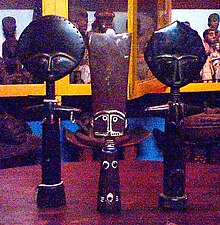This article has multiple issues. Please help improve it or discuss these issues on the talk page. (Learn how and when to remove these messages)
|

Akua'ba, also spelled akwaba or akuba, are wooden ritual fertility dolls originating from western Ghana and nearby regions. They are particularly associated with the Fanti people, who are part of the Akan group of ethnicities in Ghana and Ivory Coast. The dolls are characterized by their large, disc-like heads and are used traditionally by young women seeking to conceive a child or to ensure the attractiveness of their future children.
When not in use, akua'ba are ritually washed and cared for in the traditional homestead. The treatment of the akua'ba has been described as an example of traditional beliefs that corresponds to many traditional beliefs in West African sympathetic magic.
While the Fanti are best known for their akua'ba, other tribes in the West African region, such as the Kru and Igbo people, have their own distinctive styles of fertility dolls. These dolls are often used in similar ways, reflecting the importance of fertility and children in many West African cultures.
Today, akua'ba dolls are more commonly seen as mass-produced works of art or souvenirs rather than as heirlooms in ritual use. However, traditional use of these dolls continues in some areas among the Fante and other Akan peoples. The form of the akua'ba has also become a symbol of good luck more broadly.
Akua'ba dolls were also taken to the Americas by enslaved Africans, where they served as symbols of connection to their ancestral homeland and were used as good luck charms. Europeans who visited Africa, particularly during the 1800s, were highly interested in Fante dolls, leading to their popularity in many museums in Europe.
See also
References
- Risen, Clay (2021-02-25). "Loretta Whitfield, Whose Black Doll Was 'Ahead of Its Time,' Dies at 79". The New York Times. ISSN 0362-4331. Retrieved 2024-06-07.
- Nozedar, Adele (2016). The illustrated signs & symbols sourcebook. HarperCollins Publishers. ISBN 978-0-00-795131-4. OCLC 948789798.